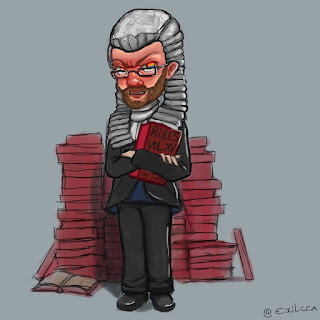 |
| Wonderful artwork by our very own Berserker Bard. |
Hello, and welcome to my courtroom. I am Judge Bookman, and it is my solemn duty to put on trial every film adaptation of very book in the known universe.
But first, its time to lay down the law.
As we all know, film adaptations of works of literature (and various other media as well) have always been very common. After all, to adapt an existing story into a new medium both saves coming up with a story of your own, and guarantees an audience for the finished work. To make such a film, then, seems to be quite a simple proposal. And yet, so many get it so very badly wrong, and break the sacred rules that is my duty to uphold and enforce. For your education, and in no particular order, I now present these rules.
Rule 1. Do not make unnecessary changes to the plot.
It is only natural that when adapting a story, there will be some changes. It is unavoidable. The way a story flows in print will never truly flow the same way on film. Lord of the Rings set down verbatim to film would become a very dull film indeed. So yes, by all means change the plot when appropriate. But do so with care. With every change made, you take the film further away from the authors vision - and thus you risk destroying said vision.
Rule 2. Make sure the characters are still recognizable as those from the book.
Again, changes have to made in the transitional process, but with characters, there is much less leeway. Or at least, there should be. However, invariably our beloved heroes, villains, and sundry others are often twisted into shadows of their former selves. On rare occasions, this can be a good thing - examples include Ian Malcolm from Jurassic Park, John Hammond from Jurassic Park, Lex and Tim from... actually, the entire cast of Jurassic Park could qualify. But the bad examples outweigh the good, and thus we are deprived of an essential element of what was once a favored story.
Rule 3. Make sure to re-create as much of the world as possible.
When writing a novel, a good author will endeavor to create a setting that reflects the tone of the story. This is of course especially prevalent in fantasy stories, but it is still an important factor in every story. Descriptions are key, and a good adaptation should do it's best to bring to life these descriptions. If necessary, they can be changed to a degree - the flying dementors in Harry Potter are a classic example of a good change - but they should always be easily recognisable as what they are.
Rule 4. Cast and costume correctly.
Not only should the characters act the part, they should also - when possible - look the part. Obviously, there is some room for leeway - I would be the last person to stand in the way of the right talent winning over the right look. But no film should ever make a mistake like, I don't know, casting an 18 year old to play what the Book describes as a 12 year old. I'm looking at you, Percy Jackson. And one should never choose to cast the famous actor over one who is better for the part. Furthermore, the clothes the character wears, even if not exactly the same as in the source material, should at least feel like something the character might wear.
Rule 5. Choose an appropriate soundtrack.
Obviously, giving a film a good soundtrack, one that fits the mood and style of the story, is a priority to any film-maker. But when adapting an existing story to film, it is always worth noticing if the book contain any songs. Classic examples would include the Hobbit and The Lord of the Rings, but there are others out there. And if the songs do not exist in our universe, as in the previous examples, they must be given tunes that match the world they are set in.
Rule 6. For Gods sake, make it a good movie!
This should, in theory, be the easiest rule to follow. But of course, it is broken far too many times. The worst way to disrespect a book is not to twist and ruin the plot, characters, and setting, but to make the finished product a bad movie. Not only is this a waste of money to all concerned, but doing so casts a pall over the existing story, meaning that less people will be willing to read the original.
And these are my rules, the laws around which my courtroom is based.
Study them.
Learn them.
Obey them.
Comments
Post a Comment